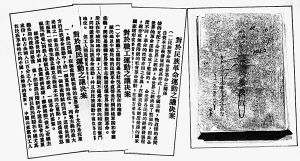More languages
More actions

The 4th National Congress of the Communist Party of China (中国共产党第四次全国代表大会) was held in Shanghai from January 11 to 22, 1925. 33 representatives attended the meeting representing 994 party members. Some of the notable members that attended were Chen Duxiu, Cai Hesen, Qu Qiubai, Tan Pingshan, Zhou Enlai, Peng Shuzhi, Zhang Tailei, Chen Tanqiu, Li Weihan, Li Lisan, Wang Hebo, Xiang Ying, and Xiang Jingyu.[1]
Kuomintang Issue[edit | edit source]
In June 1924, Deng Zeru, Zhang Ji, and Xie Chi of the Kuomintang, submitted the "Case of Impeaching the Communist Party" to the Central Executive Committee of the Kuomintang, claiming that the joining of Communist Party members in the Kuomintang "would seriously hinder the survival and development of the party" and that it's "absolutely inappropriate that there are parties within parties". In August, Zhang Ji and others released the "Party Protection Manifesto", slandering that the purpose of joining the Kuomintang was to destroy the Kuomintang. Facing the attack of the Kuomintang, the Central Committee of the Communist Party of China issued a party circular on July 1, requiring party organizations at all levels to resolutely expose the reactionary activities of the Kuomintang. Chen Duxiu, Yun Daiying, Qu Qiubai, Cai Hesen, etc. successively published articles denouncing the reactionary words and deeds of the Kuomintang for violating the Kuomintang's major political platform and undermining the unity of the revolutionary ranks. At the time, the important question before the communists was: in this rising wave of revolution, should the communists organize the Chinese workers, peasants and youths under the banner of the Kuomintang for the national revolutionary movement, or should the communists directly organize the masses?[1]
Measures Passed[edit | edit source]
The congress passed 11 resolutions, including the "Resolution on the National Revolutionary Movement". The importance of this resolution and this congress meeting was that for the first time, the issue of the leadership of the proletariat in the democratic revolution and the alliance of workers and peasants was clearly raised. The "Resolution on the National Revolutionary Movement" stated: "The political party of the proletariat should know that the proletariat participates in the national movement, not to participate in the subordinate bourgeoisie, but to participate in its own class-independent status and purpose. The proletariat is the most revolutionary class." It also stated that the democratic revolution "can only be victorious if the most revolutionary proletariat participates vigorously and takes the leading position." Another resolution that was passed, the "Resolution on the Peasant Movement", clarified that the peasants are the allies of the proletariat, emphasized the important position of the peasants in the Chinese national revolution, and pointed out that if the peasants are not mobilized to fight, the leadership of the proletariat and the success of the Chinese revolution was impossible. In addition to these resolutions, the congress made regulations on the revolution, pointing out that while "opposing international imperialism," it was also necessary to "oppose feudal warlord politics" and "oppose feudal economic relations."[1]
Election Results[edit | edit source]
A new central executive committee was elected with nine members and five alternate members. The nine members elected were Chen Duxiu, Li Dazhao, Cai Hesen, Zhang Guotao, Xiang Ying, Qu Qiubai, Peng Shuzhi, Tan Pingshan, and Li Weihan. The five alternate members elected were Deng Pei, Wang Hebo, Luo Zhanglong, Zhang Tailei, and Zhu Jintang. Chen Duxiu was later elected general secretary of the Central Committee and director of the Central Organization Department, while at the same time Peng Shuzhi was appointed as the director of the Central Propaganda Department, Zhang Guotao was appointed as the director of the Central Department of Industry and Agriculture, and Cai Hesen and Qu Qiubai were members of the Central Propaganda Department.[1]
Outcome[edit | edit source]
The 4th National Congress of the Communist Party of China made political, ideological, and organizational preparations for the climax of the Revolution. After the congress, the revolutionary situation in the country had developed rapidly, the labor movement had surged, the peasant movement was vigorous, and the climax of the Revolution had come. [1]
